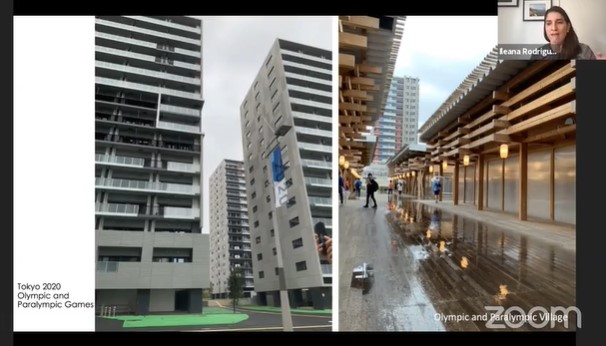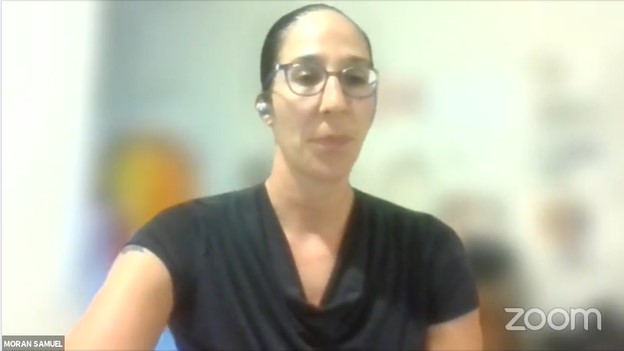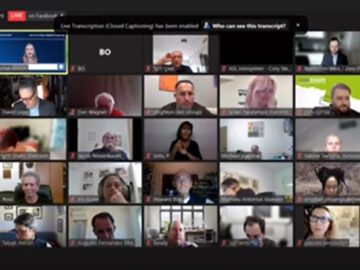Access Israel’s last international webinar took place on October 26th and focused on “Paralympic Games Accessibility and Inclusion – from Tokyo 2020 to Paris 2024.” There were +400 registered from +80 countries and hundreds more watched through Facebok Live.
The goal of the conference was to bring the international accessibility community together to share ideas, learn from each other, and improve accessibility in the Paralympic games. The speakers were very inspiring and shared their knowledge in the field.

Michal Rimon, the CEO of Access Israel opened the webinar and welcomed the hundreds of guests: “We are going to talk about the accessibility of the Paralympic Games and how we can all make sure that as we progress to a more accessible era, we make sure that sports are accessible for all.”
Here are some of the greatest moments from our amazing speakers (in chronological order): Robin Tim Weis, Manager, Public Sector, Zero Project, Essl Foundation, Austria:
“We’re currently fortunate to have partners in 180 countries around the world and that’s where I see that disability inclusion is really a team sport that we can only win as a collective.” Dr. Yehoshua-Shooky Dekel, President Israel Paralympic Committee & Former Director Sport Authority in the Ministry of Sport, Israel:
“I believe that at least our athletes are an example that everybody is equal, and they proved that in Tokyo Paralympic Games. All that is left to give them is an equal opportunity, and especially to make daily life accessible for them.” Yuval Wagner, Founder and President, Access Israel, Israel:
“It’s about accessibility, but not only the accessibility of the Games […] It’s making life accessible through the challenge of the IPC.” Mike Peters CEO, International Paralympic Committee, Germany:
“We believe that change starts with sport and that the work of the Paralympic Movement is a catalyst for driving social inclusion and advancing the UN Convention on the Rights of Persons with Disabilities.”

Shinji Nakamae Deputy Senior Director of Paralympic Games Integration Office, The Tokyo Organizing Committee of the Olympic and Paralympic Games, Japan:
“We have great involvement of NPC Japan National Federation, as well as those of the IPC International Federations to emphasize the importance of accessibility in operational planning.” Ileana Rodriguez, IPC Accessibility Consultant to the IPC and Paralympian, I Design Access, USA:
“We have to look at our users first, then that would dictate our design approach.”

Chapal Khasnabis, Head (a.i), Access to Assistive Technology and Medical Devices Unit, World Health Organization, Switzerland:
“Paralympics and assistive technology, I think it goes hand in hand. It’s made for each other, and it’s a win-win combination because its focus is more on ability than disability.” Peter Franzel, Head of Global Events Exhibitions & Sports, Ottobock, Germany:
“We keep the athletes on their wheels, we keep the athletes on their prosthesis. They can focus on the sport, and we take care of their equipment.” Moran Samuel, Paralympic Medalist and Motivational Speaker, Israel:
“It was as romantic you can imagine with a slow-motion, music in the background, and butterflies all over my chest. For me, that was maybe the first time that I felt this is where I belong.”

Amanda Dennis, Paralympic Medalist, USA:
“There’s so much left behind by the Paralympics that people understand disability after it so much better than before.” Husnah Kukundakwe, Youngest Paralympian Swimmer, Uganda:
“Some days from now or some years from now, I’ll be talking to different people, different kids with disabilities going to the schools, people who are also not disabled so that kids with disabilities are accepted as normal kids in multiple schools.” David Legg Professor, Mount Royal University, Canada:
“You’re seeing governments now identifying this idea of impact and legacy on a variety of elements and not just economic, and I’m going to suggest that that’s the future of research as it relates to Paralympic Games.” Craig Spence, Chief Brand and Communications Officer, International Paralympic Committee, Germany:
“We want to put disability at the heart of the inclusion agenda.” Josh Loebner, Disability Advocate, Content Creator & Keynote Speaker, USA:
“Brands need to recognize that not only are the athletes with disabilities disabled throughout the entirety of the year but also consumers, people with disabilities want to be able to connect and embrace with the brand regularly and repeatedly.” Ludivine Munos, Head of Paralympic Games Integration, Paris 2024 Olympic and Paralympic Games Organizing Committee, France:
“The objective is to have […] a very good experience for Paralympians, which have the same level of sports like in the Olympic games.” Osnat Fliess Douer (Ph.D.), Director Science & Technology, Israel Paralympic Committee, Israel:
“The Israeli Paralympic Committee has a vision that the Israeli Paralympic Committee will lead the athletes to the highest level of achievement, and the Paralympic Games will promote national pride and inspiration for the Israeli society.” Ian Cropp, VP Sponsorship, Citibank, USA:
“We really wanted to lean into the athleticism, not the story of their disability, but we still wanted to show that we have athletes who are disabled, but they’re phenomenal athletes.” Victor Calise, Commissioner for Rights of People with Disabilities, NYC Mayor’s Office, USA:
“Disability sport is part of everything, but it’s important that we make things accessible: making sure that our playgrounds are accessible because that’s where kids meet, kids meet up at those essential places; having that commitment to making our playgrounds in our parks accessible so people with disabilities can gather at that young age, so they’re included in every step of the way; making sure that our schools are including disability sport, and they’re making sure that nonprofit organizations are continuing to get support from places and corporations like Citi to really drive sport to the new route.” Michal Rimon, CEO, Access Israel, Israel:
“We did begin this webinar about Paralympic sports, but of course, the effect is a ripple effect, like you’ve all said at the beginning, and this is what we’re aiming at.”
We thank all the speakers for their interesting lectures and for their time and effort and appreciate that they took part in our webinar.
If you couldn’t join us, or you want to listen again to some of our great speakers you can access it here:
https://global.aisrael.org/






